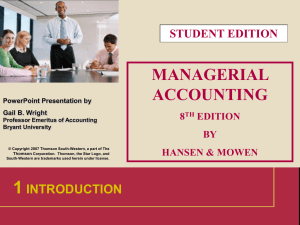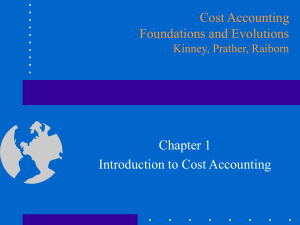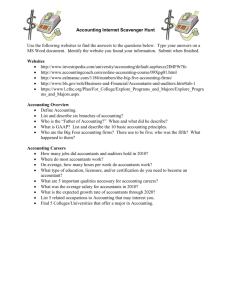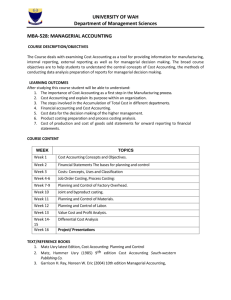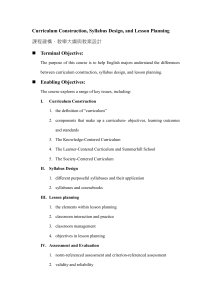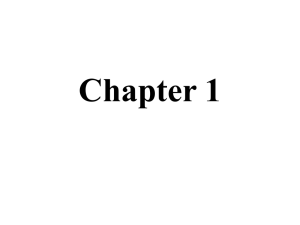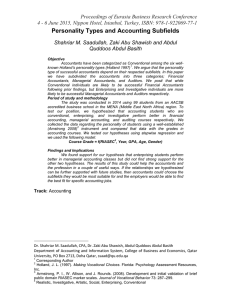SAMPLE Course Syllabus (students should use current syllabus
advertisement
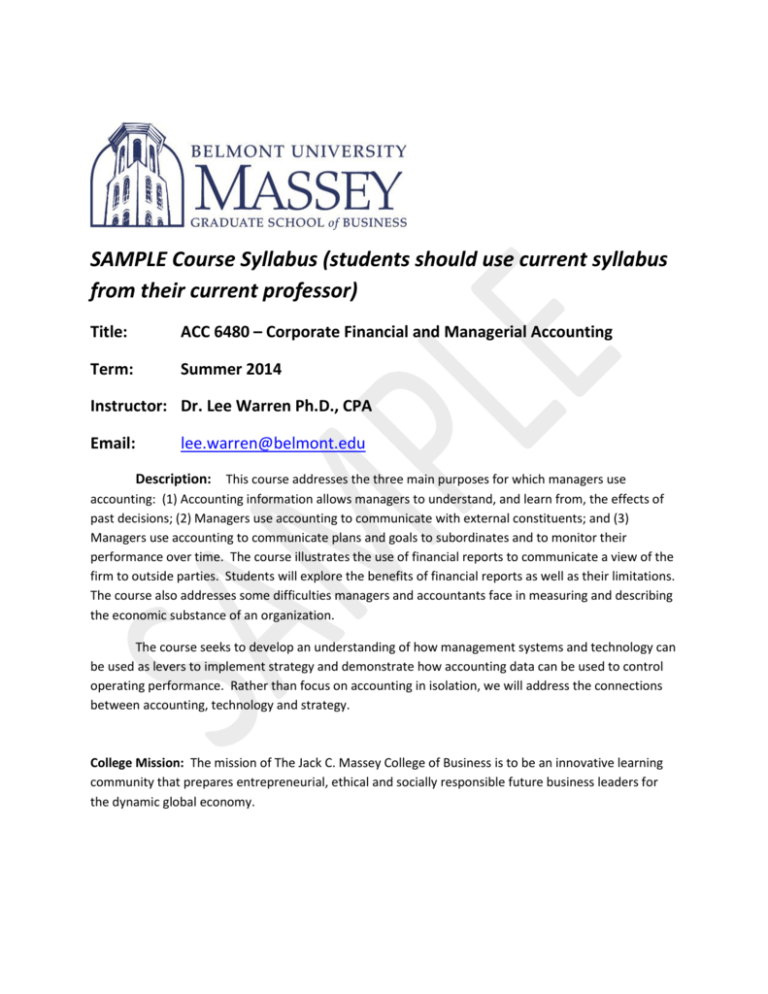
SAMPLE Course Syllabus (students should use current syllabus from their current professor) Title: ACC 6480 – Corporate Financial and Managerial Accounting Term: Summer 2014 Instructor: Dr. Lee Warren Ph.D., CPA Email: lee.warren@belmont.edu Description: This course addresses the three main purposes for which managers use accounting: (1) Accounting information allows managers to understand, and learn from, the effects of past decisions; (2) Managers use accounting to communicate with external constituents; and (3) Managers use accounting to communicate plans and goals to subordinates and to monitor their performance over time. The course illustrates the use of financial reports to communicate a view of the firm to outside parties. Students will explore the benefits of financial reports as well as their limitations. The course also addresses some difficulties managers and accountants face in measuring and describing the economic substance of an organization. The course seeks to develop an understanding of how management systems and technology can be used as levers to implement strategy and demonstrate how accounting data can be used to control operating performance. Rather than focus on accounting in isolation, we will address the connections between accounting, technology and strategy. College Mission: The mission of The Jack C. Massey College of Business is to be an innovative learning community that prepares entrepreneurial, ethical and socially responsible future business leaders for the dynamic global economy. Course Objectives: Understand the role of financial reporting as the link between managers’ decisions and investor and creditor decisions. Focus on what accountants do and why they do it, rather than how they do it. Focus on how managers can manage better because of what accountants do and how managers can use accounting reports, systems and information as effectively as possible. Increase familiarity with the accounting framework and how it is used in evaluating economic conditions and success and in decision-making in organizations. Develop a sense of the conceptual basis of accounting as it is carried out in organizations today. Increase familiarity with financial statements, accounting reports and the vocabulary found within them. Develop a sense for how managers use a reporting strategy in communicating with each other and with parties external to their organization. Understand the complexity of determining and using information on the cost of products and services produced by an organization. Understand the power of measurements in coordinating, motivating and evaluating the activities of employees and managers in modern organizations. Understand accounting in the context of the larger organization and its connections to other systems within the organization. Focus attention on the interrelationships of accounting and technology systems with the development and implementation of strategy. Habituate a practice of looking for interconnections rather than focusing on disciplinary boundaries. Class Session 1 2 Read Before Class Turn In at Class Class Syllabus “Accounting Framework, Financial Statements and Some Accounting Concepts” “Chemalite, Inc.” “Recognizing Revenues and Expenses: Realized and Earned” 2. Restating Revenues and Earnings at INVESTools, Inc. Class Plans The first class will provide an introduction to accounting’s conceptual framework. We will review the overriding principles that guide accounting decisions. We will review some mechanics based on your preparation of the Chemalite case. The case will also highlight the use of discretion in accounting. In the second half of class we will introduce the integrated project for the term. The class will address the discretion required of managers in applying accounting rules and concepts. Particular items of discussion will include revenue recognition, financial reporting and overhead. Labor Day – No Class 3 ”Measure Costs Right: Make the Right Decisions” “Stage II: Standard Cost and Flexible Budgeting Systems” G. G. Toys 4 “Fit Control Systems to Your Managerial Style” “Management Control, Expectations, Common Knowledge, and Culture” We will review traditional costing of products, addressing the strengths and weaknesses of these systems. Then, we will consider an alternative method of allocating costs to products, services, departments and customers. 3. Co-op Bank and Customer Profitability and Customer Relationship Management at RBC Financial Group After a conversation about the application of Activity Based Costing in a service setting, we will develop a framework for thinking about management control systems. Class Session Read Before Class Turn In at Class Class Plans 5 “A Stakeholder Approach to Strategic Performance Measurement” “Introduction to Responsibility Accounting Systems” “Exploring Downsizing: A Case Study on the Use of Accounting Information” 4. ForeFront Manufacturing: Production Processes and Change Management in Mainland China. The class will look at management control systems in a non-traditional environment. Our conversation will center around structuring the management control system and tools to provide both information and motivation to managers. In the last hour, we will meet with the Management of Technology class to take a test drive of the simulation. 6 “The Balanced Scorecard: Measures That Drive Performance” “Putting the Balanced Scorecard to Work” 5. EU Design’s Rise in the Apparel and Fashion Industry: Formalising Management and Incentive Systems. The class will consider the transition from being a small company to becoming a mediumsized one. In particular, we will examine the need to change organizational structures with professional management tools and systems. 7 We will discuss the use of financial ratios both internally and externally. To facilitate this discussion, we will focus on a comparison of Sears and WalMart. “Introduction to Financial Ratios and Financial Statement Analysis” 8 6. Simulation Preparation Worksheet We will use SAP to practice making marketing, pricing and production decisions. You will be challenged to use the information generated from an ERP system to support informed choices. 6. Simulation Learning Worksheet We will meet at Dr. Warren’s home for dinner and class discussion on key learnings, applications of learning and general revelry at the end of the term. 9 10 Reflect on class learning
